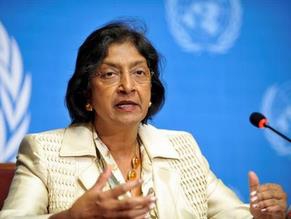|
World Jewish News

UN human rights chief Navi Pillay.
|
UN rights head raps Israel over settlements impact
14.02.2011, International Organizations UN human rights chief Navi Pillay sharply criticised Israel on Friday for ignoring the harm done to Palestinians by its Jewish settlement policy and the construction of a vast West Bank barrier.
She also condemned rocket attacks on Israel from Gaza as "war crimes" and a "major obstacle" to efforts to broker a peace agreement between the two sides.
Speaking to reporters at the end of a six-day visit to the region, Pillay said she had been shocked at the apathy among Israeli officials when she raised the issue of the suffering of Palestinians living near settlements or close to the security barrier which cuts across the West Bank.
"I have been struck by the complacency with which the entirely-avoidable predicament of Palestinians affected by the wall and settlements is treated by Israeli authorities with whom I have discussed these issues," Pillay said.
"They tend to be brushed aside as if they are minor matters. They are not. They are clear-cut violations of human rights on a very large scale," she said, describing how she had met a man whose house is entirely surrounded by a Jewish settlement.
Israel has traditionally been sharply critical of UN human rights bodies and their “biased”criticism of violations in the Palestinian territories, and has refused to cooperate with some of the world body's rights experts.
NGO Monitor, a Jerusalem-based research institution, said her visit to the region is an opportunity "to highlight her role in implementing the 2001 Durban strategy of abusing human rights claims to demonize and isolate Israel, a strategy developed at the 2001 Durban Conference."
"Under Commissioner Pillay, the United Hations Human Rights Council (UNHRC) has been complicit with the abusive regimes in Egypt, Tunisia, Syria and elsewhere, in ignoring their systematic violations while focusing its resources on attacking Israel," it said.During the visit, her first since taking over the role in 2008, Pillay made a two-day trip to the Hamas-ruled Gaza Strip, as well as visiting the nearby Israeli town of Sderot that has been hit by hundreds of rocket fired from Gaza.
"I urge militants in Gaza to halt rocket fire immediately," she said.
"They are not only committing war crimes and continuing to terrorise large numbers of civilians, they are also doing a disservice to the Palestinian people by placing a major obstacle in the path of the peace process and playing into the hands of those who wish to maintain the blockade."
But she also called for a removal of Israel's "illegal" blockade on Gaza, which has been in place since 2006 after Palestinians snatched Israeli soldier Gilad Shalit on the border with the strip who is still being held captive.
The blockade has been considerably eased in the past six months but Pillay said the remaining restrictions must be lifted.
In remarks wrapping up her trip, Pillay said her "paramount concern" was that human rights were constantly being sidelined as the politics of the conflict between the two peoples took centre stage.
"The politics of conflict, peace and security are constantly leading to the downgrading, or setting aside, of the importance of binding international human rights and humanitarian law," she said, describing human rights as "not negotiable."
Another central concern was the "dramatic rise in inflammatory rhetoric" within Israel against human rights groups and NGOs, she said, in what was understood to refer to a parliamentary inquiry into their sources of funding.
EJP
|
|
